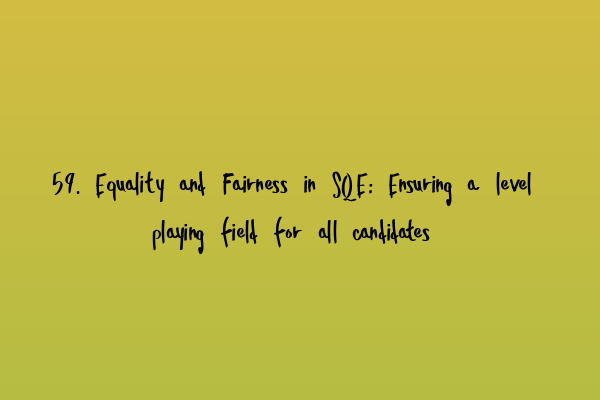59. Equality and Fairness in SQE: Ensuring a Level Playing Field for All Candidates
The Solicitors Qualifying Examination (SQE) is a comprehensive assessment that determines a candidate’s eligibility to become a qualified solicitor in England and Wales. With its implementation, it is crucial to emphasize the importance of equality and fairness in the examination process. This blog post delves into the significance of ensuring a level playing field for all candidates, highlighting the measures taken to promote equality and fairness in the SQE.
Why Equality and Fairness Matter
In any professional examination, equality and fairness are fundamental principles that uphold the integrity and legitimacy of the assessment. The SQE aims to provide equal opportunities for aspiring solicitors to showcase their legal knowledge, skills, and competencies, regardless of their background, ethnicity, or socioeconomic status. By ensuring fairness, the SQE aligns with the core principles of the legal profession, which values justice, equality, and access to justice for all.
Measures for Equality and Fairness in the SQE
The Solicitors Regulation Authority (SRA), which oversees the SQE, has implemented several measures to achieve equality and fairness in the examination process. These measures include:
- Diverse Question Formats: The SQE incorporates a variety of question formats, such as multiple-choice questions (MCQs), written tasks, and oral assessments. This diverse approach ensures that candidates from different learning styles and backgrounds have an equal opportunity to demonstrate their understanding and application of legal concepts.
- Inclusive Language: In the development of exam materials, the SRA is committed to using inclusive language that avoids any form of bias or discrimination. This includes avoiding gender-specific pronouns and using neutral terminology that is accessible and equitable for all candidates.
- Reasonable Adjustments: The SRA acknowledges that some candidates may require reasonable adjustments to ensure equal access to the assessment. Candidates with disabilities, learning difficulties, or other specific requirements can request accommodations to create a level playing field. These adjustments may include additional time, specialized equipment, or alternative assessment methods.
- Unconscious Bias Training: To further promote equality and fairness, the SRA provides unconscious bias training to all assessors and examiners involved in the SQE. This training raises awareness about subconscious biases and helps ensure that assessments are conducted objectively and without prejudice.
Through these measures, the SRA is actively working towards minimizing any potential barriers or biases that could hinder a candidate’s success in the SQE.
Key Benefits of Equality and Fairness in the SQE
There are several key benefits that arise from fostering equality and fairness in the SQE:
- Meritocracy: By removing barriers and biases, the SQE ensures that success is based on merit and the actual abilities of the candidates. This promotes a meritocratic system where those who possess the necessary skills and knowledge can thrive.
- Inclusivity: When equality and fairness are prioritized, the SQE becomes a more inclusive and accessible examination. Candidates from diverse backgrounds can confidently participate, contributing to a richer and more representative legal profession.
- Confidence in Results: Candidates who believe that the examination process was fair and unbiased are more likely to have confidence in their results. This fosters trust in the integrity of the SQE and ensures that qualified solicitors are selected based on their true capabilities.
Overall, equality and fairness in the SQE play a significant role in shaping the legal profession and ensuring that it remains ethical, just, and representative of society as a whole.
Continuing Support and Resources
To further enhance your preparation for the SQE, we recommend exploring the following related articles:
- Conquer the Multiple Choice Questions (MCQ) in SQE1
- Interactive mock tests for SQE: Enhancing engagement and learning
- SQE Sample Papers: Practice for Exam Success
- Focus Areas in SQE1 and SQE2: Mastering Key Concepts
- Adjusting Your SQE Strategy Based on Mock Performance
These resources provide valuable insights and strategies that can optimize your exam preparation and help you succeed in the SQE.
Conclusion
In conclusion, equality and fairness are integral components of the SQE examination process. By implementing measures that promote equality, the SRA ensures that all candidates have an equal opportunity to showcase their legal skills and competencies. This commitment to fairness fosters inclusivity, a meritocratic system, and confidence in the results. As you continue your journey towards becoming a qualified solicitor, remember to leverage the available resources and support to optimize your chances of success in the SQE.
